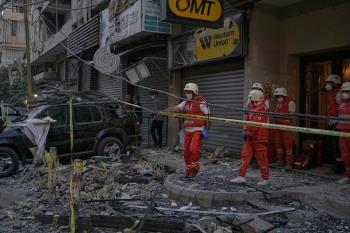Alwaght- Tensions between Israeli regime and Egypt that earlier erupted in political and security areas have now spread to include energy.
After Tel Aviv has begun reneging on its promises it made under a gas deal signed with Egypt, Cairo has sought alternatives to meet its energy needs.
Egypt has recently signed a $4 billion deal with the US firm Hartree Partners to purchase liquefied gas, a move that could reshuffle the region’s gas market and pose a serious challenge to the largest Israeli gas-export contract with Cairo.
Christopher Landau, the US Deputy Secretary of State, wrote on X that the agreement “strengthens US’s economic and commercial interests globally, creates local jobs, and provides affordable and reliable energy for countries like Egypt.” The deal comes even though Egypt had previously sourced much of its gas imports from the occupied territories.
In August, US-based NewMed, a partner in Israel’s Leviathan gas field, extended its export contract with Egypt through 2040. But in September, amid the Gaza war, signs of a policy shift emerged in Tel Aviv. Prime Minister Benjamin Netanyahu now wants assurances that Egypt will uphold all commitments under the normalization agreement before giving final approval to the deal.
Back in 2019, Egypt signed a long-term $35 billion agreement with Leviathan partners to receive cheaper gas via a direct pipeline, an arrangement that was supposed to deliver more than 130 billion cubic meters of gas to Egypt by 2040. That deal has since become a political pressure lever for Netanyahu’s cabinet.
Currently, gas flows from the occupied territories to Egypt range between 850 million and 1 billion cubic feet per day. Under a July decision, supplies were supposed to rise to 1.3 billion cubic feet by year’s end, 1.6 billion by spring 2026, and eventually 1.8 billion cubic feet in the summer. Tel Aviv, however, has delayed implementing these commitments for political reasons.
Diversifying energy sources
Egypt, largely relying on foreign suppliers for its energy, is now eying flexibility and diversifying its suppliers. Some experts told Ashargh Al-Awsat that the deal with the US shows that Egypt is still expanding its alternatives and decreasing its dependence to the Israeli gas, something that will take from Tel Aviv its lever and and help domestic gas explorations.
While the volume of gas imported from the US is smaller than that stipulated in its contracts with Tel Aviv, these supplies will diversify a portion of Egypt's energy portfolio. Although liquefied gas is more expensive than pipeline gas, its import can cover Egypt's energy needs and guarantee supply security until the large-scale development of domestic resources, particularly in the Eastern Mediterranean, gets underway.
It is noteworthy that Egypt's gas imports saw a significant 51 percent increase in the first nine months of this year, reaching 15.6 billion cubic meters. In August, Egypt was the second-largest importer of US LNG, purchasing approximately 57 billion cubic feet, which accounted for 13 percent of total American exports. Furthermore, Cairo plans to boost its domestic gas production to 6.6 billion cubic feet per day by 2030, a 58 percent increase from current levels. This ambitious goal will be pursued by drilling 14 new exploration wells in the Mediterranean to tap into its estimated 12 trillion cubic feet of reserves.
Tel Aviv using Gaza lever against Cairo
The Israeli weaponization of gas against Egypt is directly related to the regional developments and the Gaza war. Cairo's support to Palestine and opposition to the forced migration of the Palestinians has motivated Israeli moves to limit gas flow to Egypt in a bid to get Egyptian alignment or concession in Gaza case.
Saeed Aqasha, an Israeli affairs expert at Al-Ahram Center for Political and Strategic Studies, told Asharq Al-Awsat that the tensions surrounding the Israeli gas agreement stem from the Netanyahu government's view of Egypt as an obstacle to its objectives in Gaza.
"They are trying to use economic tools and restrictions on gas flows to pressure Cairo," he stated.
This approach underscores that in West Asia, energy is more than just an economic commodity; it is an instrument of strategic and security policy.
The tensions have also expanded beyond Gaza. Tel Aviv is attempting to block all pathways that could lead to Egypt's strategic and energy independence. In one recent incident, a Egyptian nuclear chemical engineer was targeted in an armed attack west of Alexandria. The incident raised serious concerns about the security of specialists and critical infrastructure, with suspicion pointing toward Israeli intelligence services. The assassination of the nuclear engineer signals Tel Aviv's efforts to constrain the energy independence of Arab nations, aiming to curb their regional influence and prevent the rise of independent players in the energy sphere.
Conversely, to counter the expansionist policies of the Israeli regime in the region, the Egyptian government has advised Abu Muhammad al-Jolani, Syrian interim president, to refrain from signing any security agreements with Tel Aviv. Such agreements could pave the way for further Israeli advances on Syrian territory. This stance has provoked the ire of Tel Aviv, prompting Netanyahu's cabinet to wield its energy leverage as a tool of pressure against Cairo by deliberately limiting natural gas supplies.
Egypt neutralizes Egyptian pressures
This situation suggests that Egypt, along with managing Gaza crisis, is countering economic and energy threats and by diversifying its supply resources and boosting its energy security tries to preserve its strategic independence and minimize taking foreign impacts.
Ramadan Abu al-Ola, an energy market expert told Ashargh Al-Awsat that "through signing gas deal with the US, Egypt has accelerated its movement to diversification of the energy resources to steer clear of challenges providing gas to industries and household consumption.
Egypt's current strategy combines source diversification, flexibility, and long-term energy security. By signing new contracts with international firms and developing domestic resources, Cairo is positioning itself to withstand pressure from Tel Aviv. Saeed Aqasha commented on this, stating, "Egypt knows that Tel Aviv may not honor its commitments, and Egyptian authorities are not counting on the agreement's continuity. Therefore, their strategic plan involves securing medium-term energy needs and creating multiple options, including cooperation with international companies, even from Russia."
However, given the strategic alignment between the US and Israeli regional policy, and the precedent set during the Ukraine war, when Washington sold its gas to European partners at quadruple the price, Egyptian policymakers cannot rely solely on continued US gas purchases. To ensure a stable energy supply and prevent a repeat of coercive scenarios similar to those employed by Tel Aviv, it is essential for Cairo to broaden its network of energy partners and create a diverse range of alternatives.
In general, as the Israeli military pressures have so far failed to force the regional countries into accepting its regional policies, resorting to energy lever to secure political gains will not go anywhere. By diversifying its energy supply at home and especially from the Mediterranean, Cairo is capable of moving past energy restrictions and substantially enhancing its strategic and bargaining position against Tel Aviv.



























